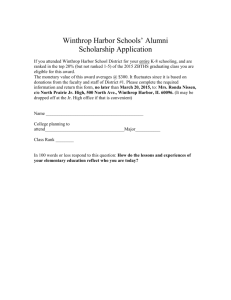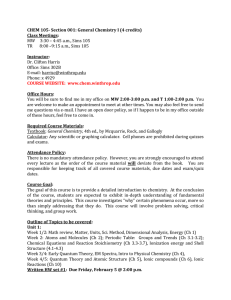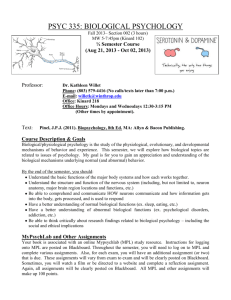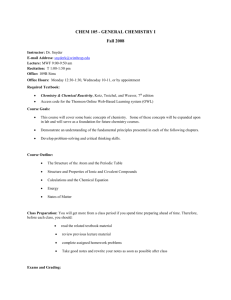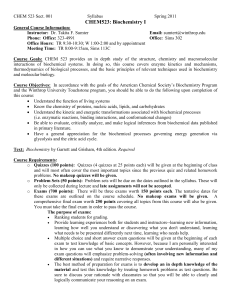Winthrop University
advertisement
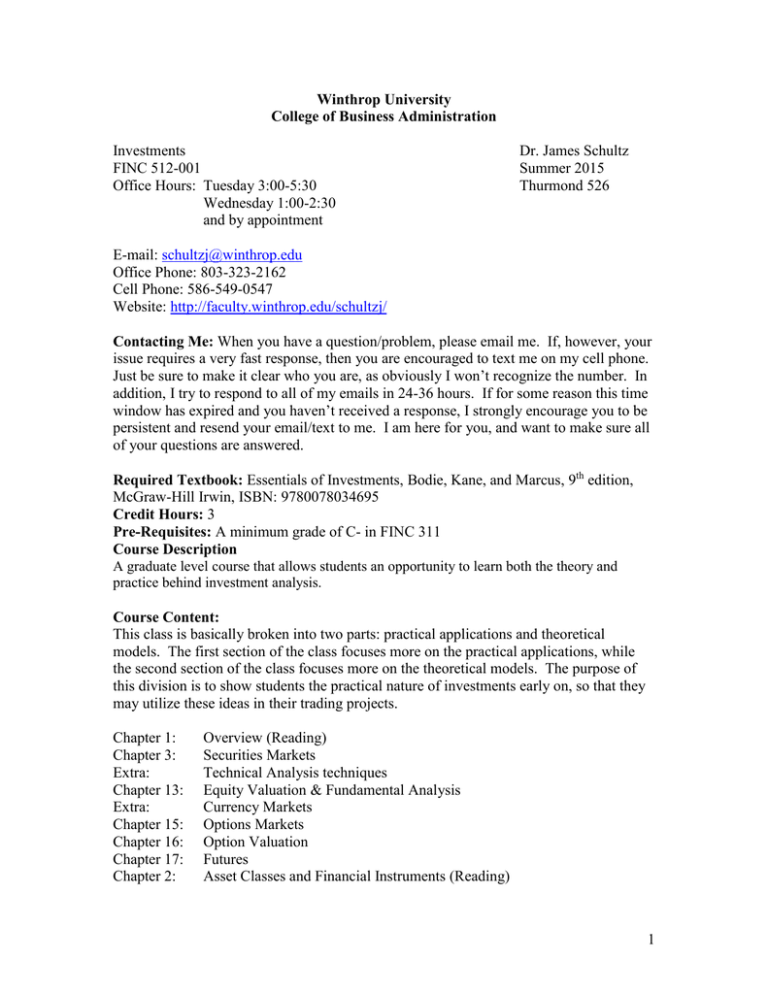
Winthrop University College of Business Administration Investments FINC 512-001 Office Hours: Tuesday 3:00-5:30 Wednesday 1:00-2:30 and by appointment Dr. James Schultz Summer 2015 Thurmond 526 E-mail: schultzj@winthrop.edu Office Phone: 803-323-2162 Cell Phone: 586-549-0547 Website: http://faculty.winthrop.edu/schultzj/ Contacting Me: When you have a question/problem, please email me. If, however, your issue requires a very fast response, then you are encouraged to text me on my cell phone. Just be sure to make it clear who you are, as obviously I won’t recognize the number. In addition, I try to respond to all of my emails in 24-36 hours. If for some reason this time window has expired and you haven’t received a response, I strongly encourage you to be persistent and resend your email/text to me. I am here for you, and want to make sure all of your questions are answered. Required Textbook: Essentials of Investments, Bodie, Kane, and Marcus, 9th edition, McGraw-Hill Irwin, ISBN: 9780078034695 Credit Hours: 3 Pre-Requisites: A minimum grade of C- in FINC 311 Course Description A graduate level course that allows students an opportunity to learn both the theory and practice behind investment analysis. Course Content: This class is basically broken into two parts: practical applications and theoretical models. The first section of the class focuses more on the practical applications, while the second section of the class focuses more on the theoretical models. The purpose of this division is to show students the practical nature of investments early on, so that they may utilize these ideas in their trading projects. Chapter 1: Chapter 3: Extra: Chapter 13: Extra: Chapter 15: Chapter 16: Chapter 17: Chapter 2: Overview (Reading) Securities Markets Technical Analysis techniques Equity Valuation & Fundamental Analysis Currency Markets Options Markets Option Valuation Futures Asset Classes and Financial Instruments (Reading) 1 ………………Midterm (will be completed online as a take-home)…. Chapter 10: Chapter 11: Chapter 4: Chapter 5: Chapter 6: Chapter 8: Chapter 18: Bond Prices and Yields Managing Bond Portfolios Mutual Fund Analysis (Reading) Risk and Return Efficient Diversification Efficient Markets Hypothesis Portfolio Performance Evaluation (if time permits) ........................Final Exam (will be completed online as a take-home)…. Exams: The two exams will be both be administered in an “online” format. The instructor will email out the exam, and then the students will have approximately 48 hours to complete the exam and return back to the instructor electronically. The final exam will contain a cumulative portion. Graduate students will take a different exam from undergraduate students. Homework: Problems will be suggested throughout the class as practice for the quizzes and exams. These may or may not be collected, but will serve as useful practice for the exams in either case. Quizzes: There will be a quiz given each night of class, except the first night. This means there will be 6 quizzes in total. Should a student know in advance that he/she will miss a given class on a given day, then that quiz can be made up in the manner deemed most appropriate by the instructor. Projects: There will be one major project that will run the length of the entire semester. Details of this project will be administered during the first night of class. There will also be several smaller projects throughout the semester. Assuming that we use the trading room software, students may need to attend several software training sessions that will be outside of regular class time. Professionalism: At a bare minimum you are expected to be on time to class and be attentive during classroom discussions. Please refrain from texting during class as this can be extremely distracting to the students around you. Persistent texters might be asked to leave class. Furthermore, the instructor reserves the right to reduce a student’s grade as far as he sees fit in any instance where a student’s actions are deemed extremely unprofessional. Be considerate of others, be engaged but do not dominate the class with excessive comments or questions. All University conduct policies apply as well. 2 Graduate students may be required to obtain Bloomberg Certification in “Equity Essentials” and “Fixed Income” before the semester ends. Grading: Midterm Final Main ToS Project Quizzes Smaller Projects Total Grades: 93% 90% 87% 83% 80% 77% 73% 70% 67% 63% 60% 59% 100 100 100 90 60 450 A AB+ B BC+ C CD+ D DF Any student who is still enrolled in the course after the withdrawal deadline will be given a grade ("A" through "F"). Furthermore, the professor reserves the right to increase a student’s grade beyond that which was earned due to “intangible” factors such as, but not limited to: effort, participation, improvement over the semester, etc. Course materials: My expectation for each and every student is high. Be prepared to move at a brisk pace and to do some work from the textbook, or another outside source, without having seen the material in class. If you miss a class, it is your responsibility to obtain class notes from someone else in class. Additional materials will be delivered via email, or posted on my website. Attendance Policy: Attendance will not be recorded weekly, but it will be extremely difficult, if not impossible to succeed in this class without regularly attending. Email: All class emails will be distributed to each student’s Winthrop email address. It is the student’s responsibility to ensure they are receiving all class emails. If a student is not 3 receiving emails then he/she should contact technology services in Tillman Hall to have the problem resolved. Students with Disabilities: Winthrop University is dedicated to providing access to education. If you have a disability and require specific accommodations to complete this course, contact Gena Smith, Program Director, Services for Students with Disabilities, at 323-3290. Once you have your official notice of accommodations from Services for Students with Disabilities, please inform me as early as possible in the semester. Student Conduct Code: As noted in the Student Conduct Code: “Responsibility for good conduct rests with students as adult individuals.” The policy on student academic misconduct is outlined in the Student Conduct Code Academic misconduct Policy in the Student Handbook online (http://www2.winthrop.edu/studentaffairs/handbook/StudentHandbook.pdf). Academic Success Center: Winthrop’s Academic Success Center is a free resource for all undergraduate students seeking to perform their best academically. The ASC offers a variety of personalized and structured resources that help students achieve academic excellence, such as tutoring, academic skill development (test taking strategies, time management counseling, and study techniques), group and individual study spaces, and academic coaching. The ASC is located on the first floor of Dinkins, Suite 106. Please contact the ASC at 803-3233929 or success@winthrop.edu. For more information on ASC services, please visit www.winthrop.edu/success. Course Goals: Analyze the risk/return relationships of assets Learn how to efficiently diversify a portfolio Understand the differences and similarities between capital asset pricing and arbitrage pricing theory Dissect the efficient markets hypothesis Learn the theory and practice behind technical analysis Become competent in sophisticated bond valuation techniques Practice using equity valuation techniques on real companies Learn how the options market works and how options are valued Understand how the futures market operates Be able to effectively evaluate portfolio performance Course Objectives & Student Learning Outcomes Students will learn the theoretical underpinnings of many financial applications and be asked to apply those concepts to real-world companies. Critical thinking skills will be sharpened throughout the entire course. Global Learning Initiative: 4 The global learning component of this course will be a detailed understanding of the world’s currency market. Students will not only learn the concepts and mechanics behind the world currencies, but they will be required to trade various currency pairs as part of their trading projects. Study Methods: The best method of studying for this course is to attend all classes, take good lecture notes, refine and study your notes, and work the practice problems and questions. Note: Remember it is your responsibility to contact me in the event of an emergency. There are two ways that I can be reached: through e-mail or my cell phone. Be thorough and exhaust both options if necessary. Any changes to the syllabus will be discussed in class and/or formalized through an official email to all registered students. Tentative Schedule: The schedule is subject to change depending on the flow of the class. Given the hybrid nature of this class, some nights will be face-to-face and some will be online. June 9th June 16th June 23rd June 30th July 7th July 14th July 21st July 28th August 4th Face-to-face Face-to-face Face-to-face Face-to-face Online Face-to-face Face-to-face Face-to-face Online Chapter 1 & Chapter 3 Technical Analysis & Chapter 13 Currency Markets & Chapter 15 Chapter 15 & Chapter 16 & Chapter 17 Chapter 10 & Chapter 11 Chapter 5 Chapter 6 & Chapter 8 Chapter 6 & Chapter 8 & Chapter 18 Students can use this time to complete their final exams Exam Schedule: Midterm – Administered July 5th and due July 7th Final – Administered August 3rd and due August 5th 5 6
